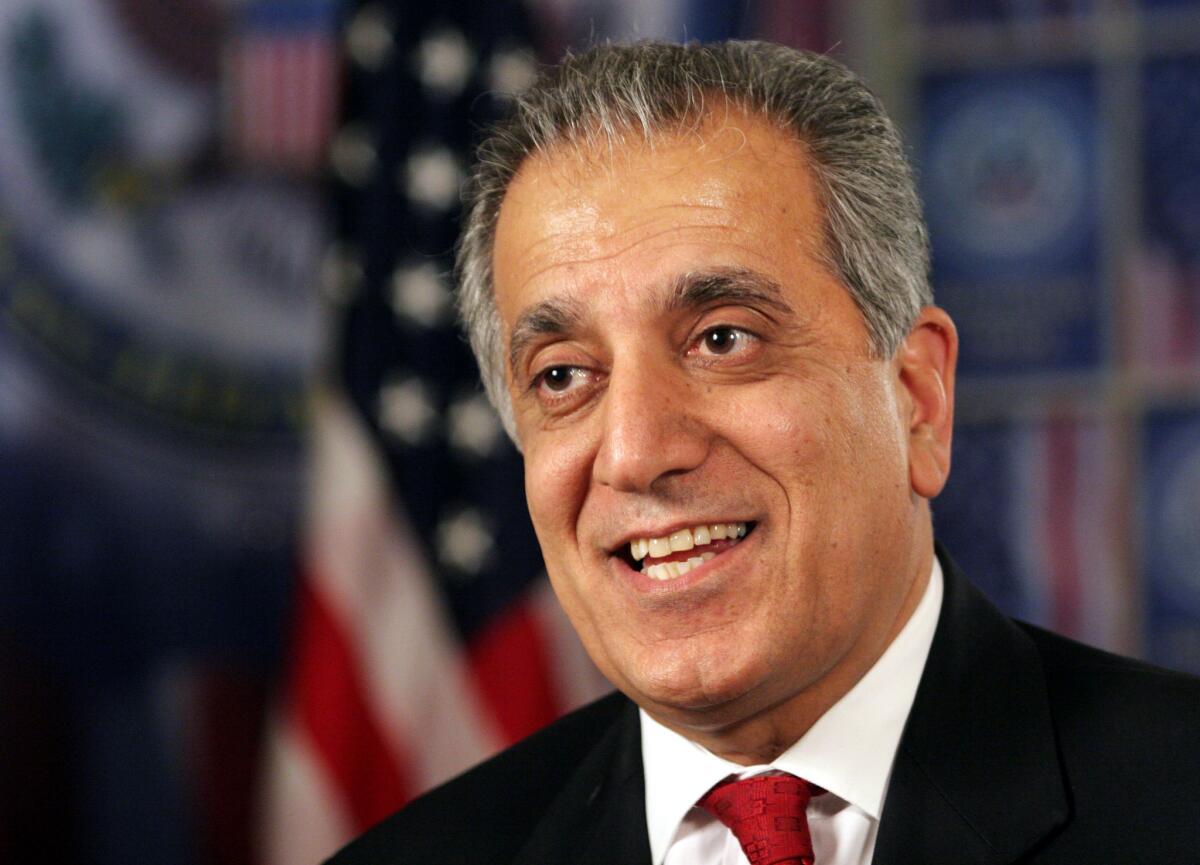Editorial: The presence of Islamic State in Afghanistan isn’t a reason to stop talking to the Taliban

Once-unthinkable negotiations between the United States and representatives of the Taliban have been making progress and could soon result in an agreement paving the way for the withdrawal of U.S. troops from Afghanistan. But anticipation over a possible breakthrough has been clouded by a concern that, even if the Taliban agrees not to provide a haven for international terrorists, an Afghan affiliate of Islamic State would continue to pose such a threat.
The rise of the group, known as Islamic State-Khorasan Province, has given opponents of U.S. withdrawal from Afghanistan what looks like a potent argument: If Islamic State’s savagery in Syria and Iraq justified military action by the U.S. even in the judgment of the intervention-averse Barack Obama, why doesn’t the group’s presence in Afghanistan counsel against withdrawing U.S. forces?
That’s a simplistic reading of the situation. The Islamic State affiliate in Afghanistan, which the United Nations estimates at between 2,500 and 4,000 fighters, is undoubtedly a problem. The group has engaged in violent attacks, including a horrific suicide bombing at a wedding celebration in Kabul in August that killed more than 60 people. There is also a real possibility that if the Taliban lays down its arms, some disaffected members of that movement will defect to Islamic State-Khorasan.
But the threat posed by Islamic State in Afghanistan doesn’t discredit the negotiations between the U.S. and the Taliban or the idea of a significant reduction in the 14,000 U.S. troops now operating in Afghanistan as trainers and advisors for Afghan forces and also in a counter-terrorism role. In fact, if an agreement between the U.S. and the Taliban leads to a political agreement between the Taliban and the U.S.-supported government in Kabul, it might actually be easier to suppress Islamic State.
President Trump has committed more than his share of foreign-policy blunders, but his decision to engage the Taliban in talks was a responsible one. It also was a reversal of position. In a speech in August 2017, Trump suggested that a political settlement involving the Taliban was a remote possibility, conceivable only after an “effective military effort” against the Taliban. Trump allowed the Pentagon to send 3,500 additional troops to Afghanistan.
Two years later, the security situation remains dire and the Taliban controls significant portions of the country. Rather than wait for conditions to improve, Trump and Secretary of State Michael R. Pompeo dispatched Zalmay Khalilzad, a former U.S. ambassador to Afghanistan and a native of that country, to hold talks with Taliban representatives in Doha, Qatar.
Reportedly those talks are aiming at an agreement in which the Taliban would promise not to allow Al Qaeda or other militant groups to operate in Afghanistan. In exchange, the U.S. and its allies would significantly reduce their forces. (Trump has indicated that he plans to reduce the number of troops to 8,600 even without an agreement.) It was because the Taliban government had provided a haven for Al Qaeda that the U.S. attacked and later deployed troops to Afghanistan after the Sept. 11, 2001, attacks.
The agreement isn’t a done deal, and even if the U.S. and the Taliban come to terms, it’s unclear whether the Taliban will be willing to negotiate in good faith with the Afghan government in Kabul — an absolute necessity, obviously, if a durable peace is to be established. There are also concerns that Trump might be tempted to withdraw all U.S. forces prematurely in order to bolster his chances of reelection next year. Pentagon officials have told Congress that even if an agreement with the Taliban is reached, threats from Al Qaeda, Islamic State and other militants will require the U.S., the Afghan government and the international community to maintain a “robust” counter-terrorism capability for the foreseeable future. (On Thursday, Trump said vaguely: “We’re going to keep a presence there.”)
Bringing peace to Afghanistan obviously will be difficult. Still, the current negotiations offer the possibility of an end to the civil war and the departure of most if not all U.S. forces after 18 frustrating, costly, bloody years of involvement. As for Islamic State, it has clashed with the Taliban in the past. Khalilzad has argued that accelerating the peace process with the Taliban will put Afghanistan in a “much stronger position” to defeat Islamic State. We won’t know if he is correct unless these negotiations continue.
More to Read
A cure for the common opinion
Get thought-provoking perspectives with our weekly newsletter.
You may occasionally receive promotional content from the Los Angeles Times.










